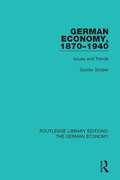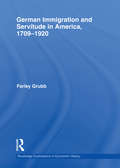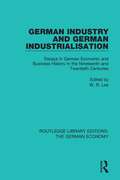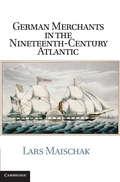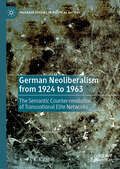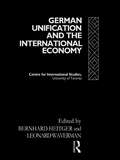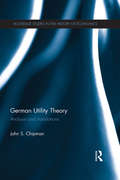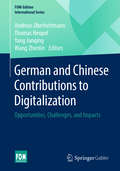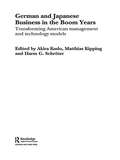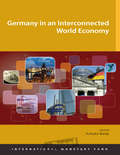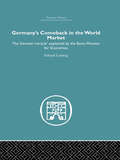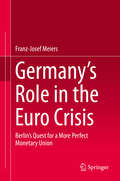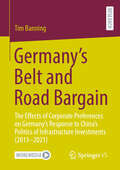- Table View
- List View
German Covered Bonds
by Manuela Spangler Ralf WernerThe Pfandbrief, a mostly triple-A rated German bank debenture, has become the blueprint of many covered bond models in Europe and beyond. The Pfandbrief is collateralized by long-term assets such as property mortgages or public sector loans as stipulated in the Pfandbrief Act. With a history that goes back to the 18th century and a high market share in today's covered bond markets, the German Pfandbrief is the most established covered bond. Until today, no single Pfandbrief has ever defaulted. Even though Pfandbriefe have survived the financial crisis comparably unharmed, investors have become more sensitive regarding the creditworthiness of the corresponding issuer and sovereign, the strength of the legal (or contractual) framework and the quality of the cover pool serving as collateral. This monograph provides a structured in-depth analysis of the legal framework and the risks inherent in a Pfandbrief, taking into consideration recent market developments. Starting from the legal framework, the German Pfandbrief is introduced without requiring prior knowledge. Covered bond related risks are explained in detail and their relevance to the Pfandbrief is thoroughly discussed with focus on the two most common Pfandbrief types, mortgage and public Pfandbriefe. In addition to that, the monograph comes with an extensive collection of Pfandbrief-related literature and a glossary explaining the main technical terms.
German Economic and Business History in the 19th and 20th Centuries
by Werner PlumpeGerman economic history in the industrial age has classically formed an important basis for the study of economic growth and industrialisation more generally. This book aims to introduce English-language readers to modern German economic history based on a selection of work by one of Germany's leading economic and business historians, Werner Plumpe, who places particular emphasis on the institutional structure of the economy. Plumpe's work demonstrates that the country's economic evolution can only be understood by paying close attention to institutional peculiarities, such as the shape of industrial relations and the dynamics of corporate decision-making. It also emphasises the importance of the interconnectedness of capital and labour in the German coordinated market economy and draws attention to individual events and decisions that may have driven long-term economic development, but are rarely considered in approaches that deal primarily with macroeconomic growth. German Economic and Business History in the 19th and 20th Century shows that Germany's economic history still warrants the application of an institutional view of economic transformation that is slightly different from the more formal perspectives dominant in the UK and the US. The book serves as a practical demonstration of a historicist approach to economic history introduced by the German Historical School a century ago, which still inspires large parts of German economic historiography.
German Economy, 1870-1940: Issues and Trends (Routledge Library Editions: The German Economy #12)
by Gustav StolperOriginally published in 1940, this book remains an illuminating and forceful survey of the economic development of modern Germany. It reveals for the first time the basic trends of German business enterprise towards central control. This survey makes three important factors clear. Firstly, the continuity in the underlying trends of German history; secondly the characteristic prevalence of 'statism' in German history; thirdly, Nazism cannot be explained on purely economic grounds: no other county showed such a striking sequel of ups and downs as that which this book illustrates in the economic history of the late 19th and early 20th centuries.
German Family Enterprises: A Sourcebook of Structure, Diversity, Growth and Downfall
by Hermut Kormann Maximilian Lantelme Laura K.C. SeiboldThis professional guide presents an extensive overview of the German family enterprise landscape, with a special focus on its structure and diversity. Drawing on several scientific studies conducted by the authors, its goal is to provide a detailed assessment of the development of German family enterprises. Analyzing data from over 500 family firms, it offers a valuable reference guide for market research and academic research on family-owned enterprises. A unique factor: the authors’ revealing insights into the decline of family firms.
German Family Enterprises: A Sourcebook of Structure, Growth, Downfall and Corporate Longevity
by Hermut Kormann Maximilian Lantelme Laura K. SeiboldThe second edition of this professional guide presents an extended overview of the German family enterprise landscape including its structure and industry distribution. Its goal is to provide a detailed assessment of the development of German family enterprises. Based on several new scientific studies conducted by the authors, the prerequisits of corporate longevity and mature growth are investigated in detail. Analyzing data from over 500 family firms, the book offers a valuable reference guide for market research and academic research on family-owned enterprises. A unique factor: the authors’ revealing insights into the decline of family firms.
German Immigration and Servitude in America, 1709-1920 (Routledge Explorations In Economic History Ser. #53)
by Farley GrubbThis book provides the most comprehensive history of German migration to North America for the period 1709 to 1920 than has been done before. Employing state-of-the-art methodological and statistical techniques, the book has two objectives. First he explores how the recruitment and shipping markets for immigrants were set up, determining what the voyage was like in terms of the health outcomes for the passengers, and identifying the characteristics of the immigrants in terms of family, age, and occupational compositions and educational attainments. Secondly he details how immigrant servitude worked, by identifying how important it was to passenger financing, how shippers profited from carrying immigrant servants, how the labor auction treated immigrant servants, and when and why this method of financing passage to America came to an end.
German Industry and German Industrialisation: Essays in German Economic and Business History in the Nineteenth and Twentieth Centuries (Routledge Library Editions: The German Economy #9)
by W. R. LeeOriginally published in 1991 this book brings together 9 essays which address a number of central issues relating to the nature of German industrialisation, including the role of foreign competition in fostering technological change, the importance of market integration for economic development and the response of German banks to industrialisation. The book also provides an important corrective to the traditional interpretation of German industrialisation and reassesses the economic impact of the customs union (Zollverein). The reappraisal of some dominant themes in German economic and business history is distinctive in its explicit use of economic theory in historical analysis of long-term growth processes. It also emphasises the importance of sectoral analysis and illustrates the usefulness of a differential regional approach for understanding the process of German industrialisation.
German Merchants in the Nineteenth-Century Atlantic (Publications of the German Historical Institute)
by Lars MaischakThis study brings to life the community of trans-Atlantic merchants who established strong economic, political and cultural ties between the United States and the city-republic of Bremen, Germany in the nineteenth century. Lars Maischak shows that the success of Bremen's merchants in helping make an industrial-capitalist world market created the conditions of their ultimate undoing: the new economy of industrial capitalism gave rise to democracy and the nation-state, undermining the political and economic power of this mercantile elite. Maischak argues that the experience of Bremen's merchants is representative of the transformation of the role of merchant capital in the first wave of globalization, with implications for our understanding of modern capitalism, in general.
German Neoliberalism from 1924 to 1963: The Semantic Counter-revolution of Transnational Elite Networks (Palgrave Studies in Political History)
by Arne I. KäthnerThis book offers an in-depth study of German neoliberalism between 1924 and 1963, arguing that a neoliberal network was established in the interwar period, decades before elite networks in Great Britain and the United States fostered the ‘neoliberal revolution’ of the Thatcher and Reagan administrations. The author shows how this network strongly influenced societal developments in the 1950s and set a precedent for neoliberal projects in other countries. This success was largely due to the deliberate and strategic reorganisation of the semantic field: abandoning or reacquiring ‘abused’ concepts, challenging existing meanings, or introducing new concepts to the political scene. The book examines the Aktionsgemeinschaft Soziale Marktwirtschaft (ASM), an early neoliberal Think Tank founded in 1953 and led by Alexander Rüstow, which became an influential political actor in post-war West Germany. The author adopts a decidedly transnational approach linking and contrasting inner-German debates with those taking place transnationally among neoliberal proponents in the Mont Pèlerin Society. More than just a political study of ideologies, this book provides a historical account of the conceptual struggles over neoliberalism, the actors who engaged in them, the spheres in which they took place, and the semantic means and conceptual strategies employed, providing useful insights for scholars of German and political history, as well as political science more generally.
German Unification and the International Economy (Centre For International Studies World Economy Ser.)
by Leonard Waverman Bernhard HeitgerFirst published in 1993. Routledge is an imprint of Taylor & Francis, an informa company.
German Utility Theory: Analysis and Translations (Routledge Studies in the History of Economics)
by John S. ChipmanThere is a standard belief that the modern theory of marginal utility originated in the UK with Jevons, Germany with Gossen, Austria with Menger and France with Walras. In this new book, John Chipman introduces new English translations of important writings from German economists such as Rau, Hildebrand, Roscher and Knies showing that the introduction of this concept originated with them. This ground breaking book comes with a long introduction from John Chipman analysing the theory.
German and Chinese Contributions to Digitalization: Opportunities, Challenges, and Impacts (FOM-Edition)
by Thomas Heupel Andreas Oberheitmann Yang Junqing Wang ZhenlinDigitalization is one of the biggest challenges of the 21st Century. In Germany, the concept of Industry 4.0 goes back to the high-tech strategy of the Federal Government and describes the interlocking of industrial production with the latest information and communication technology. In the intelligent factory, intelligent and networked machines will operate, decide and optimize largely autonomously in cooperation with humans. For China, the German concept Industry 4.0 is a strategic source of inspiration. Among other things, it was a model for the current Chinese innovation and industrial policy strategy Made in China 2025. This book is looking into different aspects of digitalization. Part 1 presents the concept of Industry 4.0, both, from the German and the Chinese perspective. Part 2 describes the Chinese innovation concept Made in China 2025 within different economic sectors in China and discusses to what extent Industry 4.0 might be considered its role model. Part 3 presents the opportunities and challenges of digitalization and big data from a regional perspective. Part 4 analyses the special aspect of the impacts of digitalization for the banking sector and international trade cooperation. Finally, Part 5 focuses on digitalization and innovation considering small and medium-sized companies in particular.
German and Japanese Business in the Boom Years: Transforming American Management And Technology Models (Routledge International Studies in Business History)
by Harm G. Schröter Matthias Kipping Akira KudoThis edited volume examines the American influence on West German and Japanese industry from the 1950s to the 1970s, providing a valuable contribution to the debate on 'Americanization' from a historical and comparative perspective. Individual contributions provide an in-depth analysis of the adoption and modification of management and technological issues from the US in West Germany and Japan at the micro-economic level.
German-Chinese M&A Transactions in the SME Sector: General Conditions, Success Factors, Implementation
by Daniel GraeweM&A transactions are significantly more complex processes than the mere purchase and sale of goods - SMEs can quickly find themselves in unfamiliar territory - especially when it comes to multi-layered activities with players from completely different cultures, especially from China, as Germany's largest foreign trade partner. The need for knowledge in practice is correspondingly great. This edited volume therefore brings together, on a theoretical basis, the practical knowledge needed for the successful planning, implementation and integration of German-Chinese corporate takeovers in the SME sector. After a compact presentation of the economic background, cultural aspects of negotiation and regulatory framework conditions, the course of corporate transactions and their German-Chinese peculiarities are dealt with in detail. The book concludes with a guide to the core aspects of such transactions and an exemplary presentation of case studies. In generally understandable language and well illustrated, the success factors as well as possible stumbling blocks are revealed. A clearly structured and cleverly formulated handbook that every player should have at hand.
German-Sino Business Networks
by Alexander HäntzschelIn this book, Alexander Häntzschel presents the benefits of organized networks and provides a first-ever overview of German-Sino business networks. Based on more than 20 expert interviews and research of 30 different cases, the analysis covers the different forms of organization, their target groups and members, services and activities, and accessibility and membership fees. Complementary to the analysis, the results of a survey bring forward the experiences and expectations of professionals involved in such networks. With this Springer Brief, business professionals get a quick and useful overview of the leading networks such as the German Asia-Pacific Business Association, the German-Chinese Business Association, and the Asian Social Business Community.
Germany and the European Union: How Chancellor Angela Merkel Shaped Europe (Contributions to Political Science)
by Gisela Müller-Brandeck-BocquetThis book aims to present a coherent picture of Germany’s European policy during Merkel’s chancellorship. At the same time, it traces the development of the EU in the period 2005–2021. Accordingly, the European crises and the internal and external threats to the integration community are addressed, as well as the jointly developed solutions. Thus, on the one hand, the book shows what Germany was willing to do for Europe; on the other, it reveals how the EU was able to develop further as the most important point of reference for German politics and power.
Germany and the Politics of Europe's Money
by Karl KaltenthalerAs countries in the European Union struggle to comply with the Maastricht Treaty, the question of monetary integration is at the forefront of European politics. Germany and the Politics of Europe's Money explores how and why Germany--whose economic power makes it a pivotal player in the European monetary system--has developed inconsistent policies toward European monetary institutions and how international institutions affect domestic politics that, in turn, influence state policies toward these institutions.Moving away from state-centered and Marxist approaches to the study of the European monetary integration process, Karl Kaltenthaler offers a new analytical framework to assess the dynamics within and among the participating countries. Using official and unofficial documents as well as interviews with players ranging from presidents of the Bundesbank to functionaries in the trade unions, Kaltenthaler argues that the number of decision makers negotiating policy and their accountability to interest groups, political parties, government ministries, and Germany's central bank have made Germany's fluctuations in policy inevitable. Germany and the Politics of Europe's Money examines twenty years of German policy through an analysis of four key episodes: the creation of the European Monetary System, the creation of the Franco-German Economic and Financial Council, the establishment of policy toward the European Monetary Union, and the institutional transformation of the EMS in the 1990s. It thus brings a new understanding to Germany's dynamic policies and the political forces behind them.
Germany in an Interconnected World Economy
by Ashoka ModyA report from the International Monetary Fund.
Germany in the 1990s: Managing Reunification
by George C. Lodge James W. RagsdaleIn October 1990, eastern Germany was incorporated into the Federal Republic of Germany. The German people rewarded the architect of these changes, Helmut Kohl, with an enhanced majority in national elections. But only two years later it was hard to remember these heady times. Re-unified Germany's external and internal economic situation were out of balance. The current account fell from a large surplus to deficit. Inflation rose as the German government ran a mounting deficit to finance reconstruction. In June 1992, the Bundesbank council, the interest-rate-setting body of Germany's central bank, raised interest rates to combat this inflation. Other members of the EMS were less willing to raise interest rates as they feared recession rather than overheating. Within months, Italy devalued and the United Kingdom dropped out of the EMS. Had Kohl's reunification strategy caused the EMS crisis? What did this crisis imply about the hopes for closer European integration?
Germany's Comeback in the World Market: the German 'Miracle' explained by the Bonn Minister for Economics
by Ludwig ErhardA great deal has been talked about the economic recovery of Western Germany since the Second World War. It is know htat this recovery was accompanied by the return of the Federal Republic to the markets of the world. Not so much is know abotu the details - about the work effected through the opitimism of the Minister for Economics, Professor Ludwig Erhard. In this book, the minister himself speaks. A detailed description is given of the stages by which first the Bizone, and then the Federal Republic, has effected the remarkable comeback which has created keen interest and concern. The book goes into the full detail which might be expected from on who is in charge of the entire machinery. The description of the way in which Government policy was employed to stimulate a free market economy is of great technical interest. Equally important is the detailed description of the way in which every nook and cranny is exploited to give the Federal Republic a foothold in foreign markets. No opportunity is neglected, from the fostering of the most ambitious long-term capital development schemes to the publication of day-to-day reports on trade openings. This book was first published in 1954.
Germany's Role in the Euro Crisis
by Franz-Josef MeiersThis book analyses Germany's role in the euro crisis. Based on the perception of Berlin as the emerging capital of the European Union, the author investigates three interrelated issues: Did the German policy approach of imposing austerity programs on countries in the middle of a deep recession contribute to the successful management of the euro crisis? Does Germany extend its sway over its European partners by forcing them to surrender to the German diktat of fiscal Disziplin and economic efficiency? Is the stubborn insistence on rigid fiscal adjustment another ominous sign of the Berlin Republic moving away from the country's traditional European vocation toward an imperial leadership role? The book's main argument is that Germany's role in and responses to the euro crisis can best be explained by different concepts of self, historical memory, and institutional practices.
Germany's Three-Pillar Banking System
by Allan BrunnerGermany's banking system is made up of public sector banks, co-operatives and commercial banks, all of which differ in terms of ownership and objectives. This IMF paper compares the performance of German banks with those in France, Italy, Spain and the UK, as well as reviewing developments in Austria and Sweden. It also considers the likely reforms and challenges that lie ahead. Issues discussed include: structural change and competition in the banking sector; profitability, revenue generation and cost control; the phase out of State guarantees and the impact on public sector banks.
Germany: Geographies of Complexity (World Regional Geography Book Series)
by Olaf Kühne Florian WeberThis book addresses the highly differentiated spatial, social, cultural and demographic structure(s) of Germany, with a particular focus on the reciprocal relations between different levels of spatial development. The historical development of Germany serves as a background in order to provide context for the development of spatially relevant ideas and ideals (whether in relation to politics, landscape, or culture). In this regard, questions of divergence and convergence become highly salient. The book makes the complexity of spatial and social developments in Germany comprehensible. The neopragmatic approach adopted here allows bringing together different theoretical strands while providing a basis for independent regional geographic research at the same time. Beginning with an overview of the physical structures of Germany which provides the material point of departure for the societal development of Germany, key aspects of the German history are discussed. Particular attention is paid to the reciprocal influence between material substrate and notions of landscape. Here, specific ‘German’ trajectories of aesthetic and normative conceptions of landscape become clear. A common theme throughout the book are questions of divergence and of efforts towards convergence, which become evident when considering past and present economic, political, and demographic developments. Efforts to tackle current challenges, such as adapting to climate change and mitigating it, or securing raw materials, also become apparent. The complexity of spatial processes in Germany is illustrated in case study regions dealing with the challenges of structural change in traditional industrial regions (such as the Ruhr area), or e.g. efforts of Berlin to position and find itself as the capital of a unified Germany. Overall, the book shows how theory-driven regional geographic research can make spatiotemporal complexities tangible and comprehensible.
Germany’s Belt and Road Bargain: The Effects of Corporate Preferences on Germany’s Response to China’s Politics of Infrastructure Investments (2013 – 2021)
by Tim BanningIn recent years, the Belt and Road Initiative (BRI) has not only transformed global trade relations but also tested Germany’s political strategies. This book explores the German Federal Government’s ambivalent response to China’s politics of infrastructure investments under the BRI during Angela Merkel’s tenure as Chancellor, raising crucial questions about Germany’s bilateral relations with China, its economic ambition, and its geopolitical responsibility. This book provides a detailed account of the key political processes and decision points that influenced the Federal Government’s stance towards China’s politics of infrastructure investments. Through its analysis of the interactions between domestic politics and international relations, it aims to offer a nuanced understanding of the complex dynamics between the state and business. It examines how the varying interests of numerous industry sectors impacted the Federal Government’s response to China’s politics of infrastructure investments across multiple policy domains, covering Germany’s policy on foreign investments and foreign trade, its industrial policy, its broader foreign policy, and its role in European politics.
Germany’s Economic
by Jack EwingIn Germany's Economic Renaissance, veteran European correspondent Jack Ewing of The International New York Times explains how a country with some of the highest labor and energy costs in the world beat the odds to become the third-largest exporter of manufactured goods, after China and the United States. Men and women who manage German companies both big and small explain how any company can behave like a multinational, as well as the secrets of conquering the high end of the market where quality is more important than price. Both informative and entertaining, filled with rich character studies, this book is essential reading for everyone wondering how to bring factories - and the jobs they provide - back to American shores.


